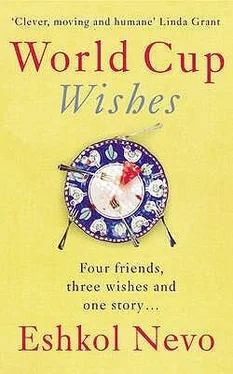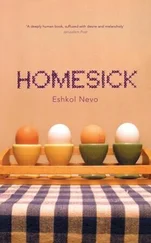It’s that I’ve gone through a profound inner change these last few months, and I want it to show on the outside, too, Ilana the Weeper answered.
*
It’s all because of that Maria of yours, Amichai said to Ofir the next day — one-third joking, two-thirds serious.
The four of us were lying in huge hammocks in the wooden house that Ofir, Maria and her daughter had rented on the beach in Michmoret. Maria had decorated the house tastefully. She filled the living room with light-coloured wooden furniture, and hung the walls with delicate thangkas , Buddhist paintings they’d bought — she once told me proudly — from the artist himself. She’d spread a large rug on the floor and put two large cushions on it that you just felt like sinking into, and on the shelves she herself had built, she’d put Ofi’s magnificent, ostentatious CD collection, along with some small leather drums, giant-size wooden clogs, Indian notebooks, shampoos and soaps made by the Himalaya Company.
I could go on describing more and more of that house, but I still wouldn’t be able to capture the special music she managed to create in the spaces between all those objects, music that said only one thing: home.
It’s … nice that you’re working so hard at it, even though we’ll be going to Denmark very soon, Ofir said cautiously one evening when he saw her taking a handful of screws out of the toolbox again.
Ofi, my love, haven’t you heard? We’re not going to Denmark after all, she said without putting down the screws.
We’re not? Ofir said, standing stock still.
I like it here, she said. Most of the people in the streets know English, there’s light twelve months a year, and God has given me Lana as a gift.
But didn’t we decide to try living together in Copenhagen? Ofir said, surprised.
That’s just the problem with Western thought, she said the familiar-sounding words. We make decisions, and then we become slaves to our decisions. And we try so hard to make them work that we don’t notice that in the meantime, they’ve become irrelevant.
But wait a minute, he tried to fight for the good-life-in-Scandinavia dream, what about the occupation? And the living conditions of the Palestinians? That doesn’t bother you any more?
Just the opposite, Maria said. Now that this Intifada, you know, number two, has started here, I have to stay. To keep going to those women’s meetings with Lana. To make sure that, in all this war, people on both sides keep their humanity. That they don’t turn into animals.
Every Tuesday, Maria and Ilana the Weeper went to a meeting of Women Against the Occupation. And every other Saturday, they’d go to stand at one of the army checkpoints on the West Bank and document the injustices taking place there. On Mondays, they’d meet to work on the article Ilana had started writing, ‘Coping With Winter Depression: the Danish Case’. On Wednesdays, they’d take the children to Yarkon Park. Or to the unspoiled beach at Michmoret. And on Thursdays, they met regularly to work on marketing the new touch therapy clinic Maria and Ofir had opened at home (only a few weeks after they opened it, appointments were already hard to come by. Ilana the Weeper gave the first push when she circulated their phone number to the weary-bodied academic sector, and it spread from there. Which didn’t prevent her and Maria from continuing their Thursday meeting ‘to maintain the momentum’).
And so, every day for weeks, Ilana the Weeper was exposed to the light Maria radiated. And it gradually began to have an effect on her.
She stopped wearing those eternal beige trousers of hers and switched to dresses that flattered her stem-like body.
She smiled occasionally.
She stopped sitting off to the side during get-togethers at her house. Instead, she would find a place next to Maria and join the conversation every once in a while (most of her comments were still critical, but at least she participated).
She began investing a lot of time preparing healthy meals. (Actually, I missed her home-baked burekas .)
She showed a slight interest in football and made a very charming effort to understand the difference between active offside and passive offside.
She found out that, for years, we’d been calling her Ilana the Weeper behind her back, and instead of bursting into tears, she burst out laughing — after which, it was hard to keep calling her that.
Wife, you’re changing right in front of my eyes, Amichai told her one night. In the dark. In bed. A car alarm broke into sporadic shrieks, then was silent.
Don’t exaggerate, Ilana said.
No, really, Amichai insisted gently. Something is happening to you.
So how do you feel about it? Ilana asked, and stroked his chest.
I’m glad … I mean … I love you … I mean … I’m glad you’re happy … It’s just that …
Just that … what? Ilana asked, trying to drag it out of him.
Amichai didn’t say anything. She thought he’d fallen asleep when he suddenly said in a choked voice: it’s just that I’m not the reason for it.
Ilana was glad it was dark and he didn’t see her smile. What do you mean? she asked, trying to sound serious.
It’s all because of Maria, Amichai said. Everything started when you met her. And I’ve been trying for years … to make you more … and couldn’t do it.
Maybe sometimes it takes a new person, Ilana said cautiously. Someone outside the circle.
Amichai took Ilana’s hand off his chest and curled up into himself.
She wound herself around him again. She didn’t want him to distance himself. The car alarm began shrieking again.
But what … he stammered, what exactly does she do … What does she do that I don’t?
It’s not something she does, Ilana said, caressing his back. She’s just my friend. For the first time in my life, I have a real friend and it’s … it’s changed the way I look at things.
And I’m not your friend? Amichai asked.
You’re the man I love and she’s my friend. Those are two different things.
In what way?
Ilana sighed. It seemed she would be forced to say what she would rather have kept unsaid. You’re a man into happy colours, she said. That’s why I fell in love with you. I remember when you walked into the Personal Affairs office on the base and talked to the officer, and I watched you fling your hands around and thought, this is the kind of man I want, a man who’s happy with whatever life hands out.
But Maria’s a very positive person too, Amichai persisted.
Yes, Ilana explained. But she’s paid a visit to the opposite pole too. The darkness. She fell into the pit, pulled herself out of it and isn’t afraid to look into the pit again every now and then. You don’t ever let yourself fall into that pit.
The way you say that, it sounds like an accusation, Amichai said, and a memory flashed through his mind: a boy who always has to be happy climbs onto his mourning mother’s lap, strokes her face and says, Mummy, where’s your smile? Your smile got lost?
Not at all, Ilana said, and began rubbing his neck. It’s what I love about you, your optimism.
Amichai hesitated, troubled by the memory. So … so because Maria was in the pit, that makes her … makes her what, actually?
I feel normal with her, Ilana said. I feel like I’m OK. That my sadness is OK. That my heaviness is OK. That my need to hide from the world every once in a while is OK. I feel understandable when I’m with Maria. Completely understandable.
And with me you don’t? Amichai said, unable to control himself. With me you don’t feel understandable? Ilana hugged him tighter from behind.
Yes, she said, but in a different way.
Amichai felt as if he didn’t understand anything. He felt a huge sense of despair spreading through him. He felt the way he did after a two-hour sales talk that ended with nothing. And then he felt his wife’s hand reach between his legs.
Читать дальше












